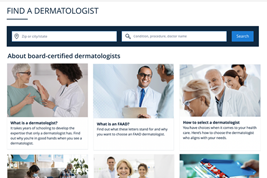Diversity champions: For community dermatologists
Community dermatologists who serve as Diversity Champions are valuable partners for academic dermatology departments in achieving diversity in dermatology. They can help solve the problem of lack of role models and mentors for underrepresented-in-medicine (UIM) students and help guide these individuals towards a successful career in dermatology.
Step one: Identify a medical school dermatology department.
Step two: Reach out to the department and ask to meet with faculty members involved in medical student education, particularly education and mentorship of UIM students.
Step three: Discuss the current opportunities at the medical school to improve diversity and how you can play a role in them.
Step four: Discuss the items in the Diversity Champion Toolkit and how these items can be implemented at the medical school and surrounding community.
Step five: Organize and participate in pipeline, mentorship, volunteerism, and educational activities towards UIM students.

Alex Ortega, MD, FAAD, assistant professor of dermatology at Oregon Health & Science University School of Medicine, works with medical and graduate students to creatively engage middle school, high school, and college students in medicine and science.
Outreach ideas
Participate in high school preparatory programs conducted by their medical school to reach out to gifted UIM high school students who come to their medical school with their parents for enrichment programs.
Participate in programs that introduce UIM high school students to the excitement and promise of cutaneous research.
Visit or coordinate visits to local colleges at least twice per year and speak to MAPS, LMSA, and SNMA chapters to encourage them to apply to medical school and dermatology in particular. Choose colleges with a high number of UIM students. State schools are often best for this purpose.

Students in the Pipeline Program are given a wristband.
Throw a pizza party for UIM medical students within the first two months of starting medical school to introduce them to dermatology as a specialty and UIM dermatologists. The UIM dermatologists should discuss why they went into dermatology and the importance of UIMs in dermatology. Consider inviting students in MAPS for the pizza party as well. Teach them about dermatology and guide them in applying to medical school.
Mentor a group of UIM medical students who volunteer to speak to UIM students in local high schools, middle schools, and elementary schools, particularly in schools with large numbers of UIM students. Monitor and support this “pipeline” program.
Mentoring ideas
Become a mentor for the Diversity Mentorship program.
Participate in mentorship programs sponsored by the Skin of Color Society, Women’s Dermatological Society, and other groups for students from diverse backgrounds.
Participate in a mentorship program made up of medical school faculty for UIM medical students to guide them during medical school, especially during the first year.
Talk to them before their first major test and after subsequent major tests.
Meet them for lunch or dinner routinely to support, encourage, and walk alongside them during this stressful time.
Guide them toward tutoring services, counseling, and upper-level students when necessary.
Help to develop a “Gotcha Covered” program (document download) at their medical school. This is where a minority faculty member is assigned a minority student as soon as they arrive to medical school.
Serve with students at a free dermatology clinic on a routine basis and get them involved in dermatology. This is often how UIM students who are on the fence regarding dermatology ultimately decide on dermatology as a career, when they see how dermatologic illnesses greatly impact the poor and marginalized individuals in our society.
Invite UIM students to participate in free screenings for skin cancer.
Serve with UIM students during medical service trips in other countries.
 Find a Dermatologist
Find a Dermatologist
 Member directory
Member directory
 AAD Learning Center
AAD Learning Center
 2026 AAD Annual Meeting
2026 AAD Annual Meeting
 Need coding help?
Need coding help?
 Reduce burdens
Reduce burdens
 Clinical guidelines
Clinical guidelines
 Why use AAD measures?
Why use AAD measures?
 Latest news
Latest news
 New insights
New insights
 Physician wellness
Physician wellness
 Joining or selling a practice?
Joining or selling a practice?
 Promote the specialty
Promote the specialty
 Advocacy priorities
Advocacy priorities
